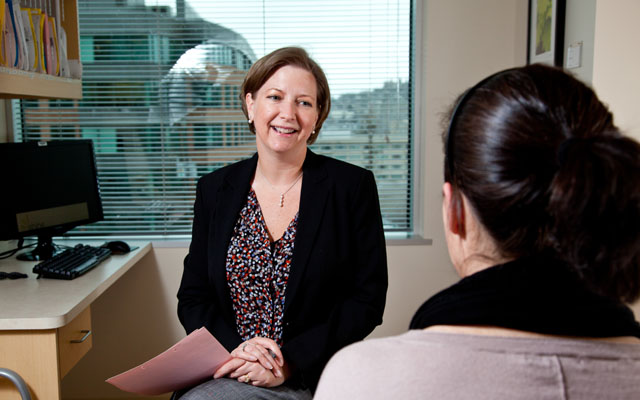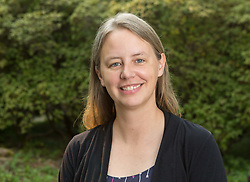Page 161 • (4,658 results in 0.059 seconds)
-
the basic liberal arts and sciences and the in-depth knowledge of her/his specified major area. The Integrative Learning Objectives In addition to the knowledge base described above, and an awareness of how different disciplinary methodologies are used, every student at Pacific Lutheran University is expected to develop the following abilities: Critical Reflection Select sources of information using appropriate research methods, including those employing technology, and make use of that
-

March 29, 2012 Photo by John Froschauer Dr. Jennifer Specht ’94 A passion for research and the needs of her patients By Barbara Clements It comes down to a series of small steps, fleeting encounters, or choices that may not seem significant at the time, but in the view of hindsight, they become key compass points that lead to one’s calling. That is the way that Dr. Jennifer Specht ’94 sees it. Specht is an assistant professor in the Division of Medical Oncology at the University of Washington
-
instructor at once Know where to find and how to use the safety equipment provided in the laboratory Laboratory Access: Students must never work unsupervised or outside of regularly scheduled hours. Never perform unauthorized experiments. When a student designs an experiment, a professor must initial the written experimental design. Other Codes of Conduct: Never engage in horseplay, pranks, or practical jokes because they may distract, startle, or confuse another student. Food and beverages are not
-
comparing Ontario’s adoption disclosure laws with those of other English-speaking jurisdictions, including Canada, Great Britain, Australia, New Zealand, and the United States. That experience forced me out of my insular focus on the United States and channeled my research interests to international adoption, and in particular, a comparative history of adoption records in global perspective. Quickly, as an unintended result of my new research interest, I became a world traveler. In July 2006, I was
-
progress.” Now that his sabbatical is over, Dr. Torvend is balancing his roles as a researcher and an educator. “Many times, “he said, “it’s been student questions or a students’ insights that have actually prompted me to move in a new direction in my research.” Dr. Torvend’s teaching has long touched on these topics, with courses in theology of nature and Jewish and Christian views on the environment. He has also sponsored a variety of conferences at PLU that focused on environmental ethics. In many
-
Sustainability in Monastic Communities Posted by: alex.reed / May 22, 2022 May 22, 2022 By Joy Edwards, ‘21 (Religion and English Major)Originally published in 2021Dr. Samuel Torvend spent his sabbatical during the 2019-20 school year researching environmental consciousness and sustainability in early medieval monastic communities. Early medieval monasteries were built to last, he emphasizes. “When these monastic communities were established, they did not think they were going to be there for a
-
structure, function, and relationships within and between plants and animals. Faculty members are also committed to helping students investigate career opportunities and pursue careers that most clearly match their interests and abilities. Students are invited to use departmental facilities for independent study and are encouraged to participate in ongoing faculty research. Bachelor of Arts or Bachelor of Science DegreeFor either the Bachelor of Arts or Bachelor of Science degree, the student must take
-
, Rebuilding Lost Polish/Jewish Connections in the School of Dialogue Program Who: Ariel Wood, Senior, Pacific Lutheran UniversityBio: Ariel Wood is a current senior studying French, Global Studies, and Economics at Pacific Lutheran University. She spent her summer in Norway as one of the 2015-16 Peace Scholars. In Norway she studied Scandinavian government and conducted individualized research with the Roma population of Oslo. Theo HofrenningTitle: Presenter, Rebuilding Lost Polish/Jewish Connections in
-

Specialist, Post-Masters Certificate as an Adult-Gerontology Acute Care Nurse Practitioner, and a Doctor of Nursing Practice Degree from the University of Virginia. She has a Post-Masters Certificate as a Family Nurse Practitioner from Pacific Lutheran University. Teaching Areas Undergraduate, Masters, Doctoral level courses including DNP Project prep, Pathophysiology, Physical assessment Scholarly Interests Dr. Schwinck’s professional interests are in the areas of undergraduate and graduate education
-
interested in the Tulane University School of Medicine PhD program and need help for the Ph.D. program application, please contact Dr. Li and send your CV to (yli81@tulane.edu) and cc to Marie Kaiser (mkaiser@tulane.edu). The lab has multiple projects that are sponsored by NIH R01 grants and are ready to move forward, including research projects in cancer immunotherapy, bioinformatics, genetics and epigenetics, development, musculoskeletal and aging diseases, inflammatory, and immune diseases, rheumatoid
Do you have any feedback for us? If so, feel free to use our Feedback Form.


